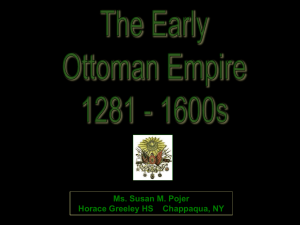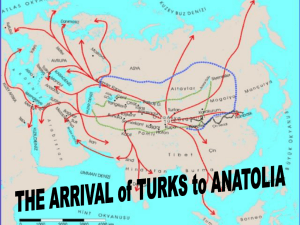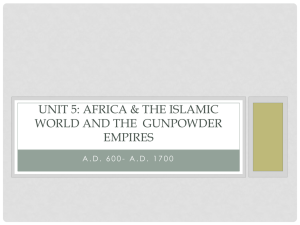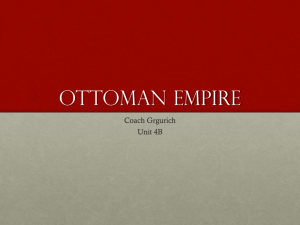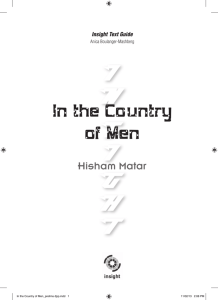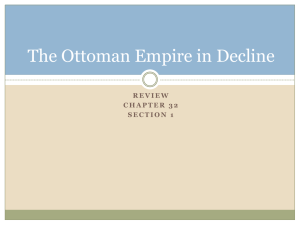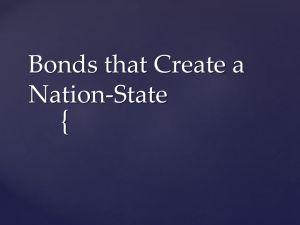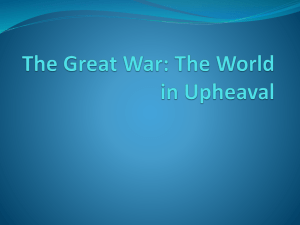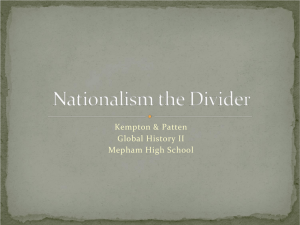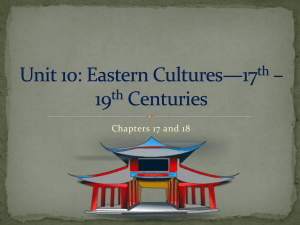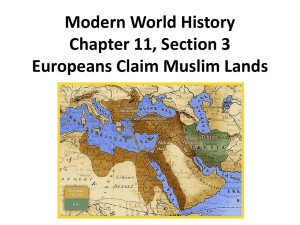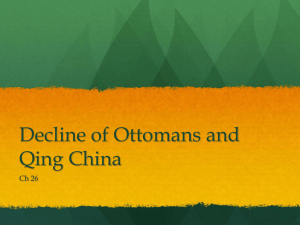The Early Ottoman Empire
advertisement
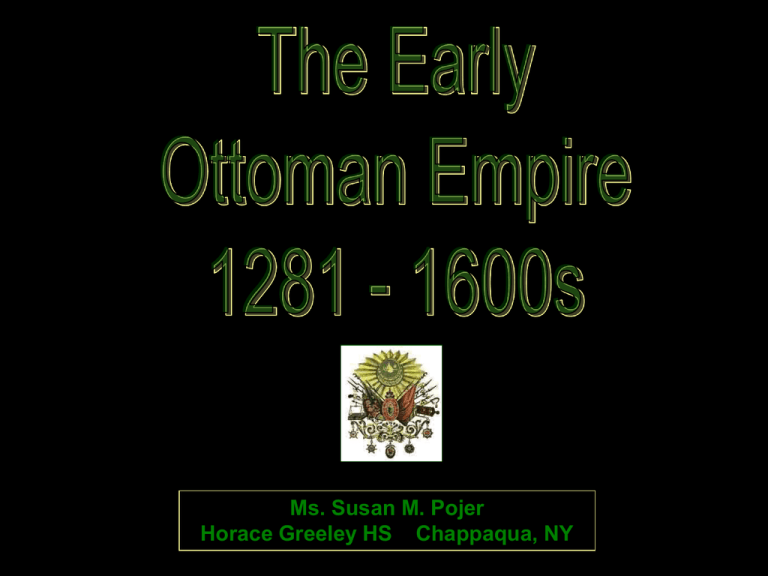
Ms. Susan M. Pojer Horace Greeley HS Chappaqua, NY Saladin 1138 -1193 Saladin 1138 -1193 Military leader …. “Kurdish” … northern Iraq - defeated the (western) European Crusaders - 1187 AD … recaptured the city of Jerusalem - would remain in Muslim hands until 1947 - tolerant … allowed Europeans to leave the Jerusalem … didn’t slaughter them … allowed Jews to resettle in part of Jerusalem … Jerusalem still open to religious pilgrims … Christian & Jewish - Cairo, Egypt … Damascus, Syria … cities protected … fortified walls One way in which the actions of Alexander the Great, Saladin, and Shaka Zulu are similar is that each implemented (1) military strategies to defeat opponents (2) constitutions to define political powers (3) policies to increase religious persecution (4) legal changes to protect human rights One way in which the actions of Alexander the Great, Saladin, and Shaka Zulu are similar is that each implemented (1) military strategies to defeat opponents (2) constitutions to define political powers (3) policies to increase religious persecution (4) legal changes to protect human rights Osman I (Othman): 1299-1326 The Golden Age of the Ottomans Tamerlane (1336-1405) or “Timur, the Lame” Mehmet I: 1413-1421 The Ottoman Bureaucracy SULTAN Divans Heads of Individual Religious Millets Social / Military Divans Local Administrators & Military Landowners / Tax Collectors Muslims Jews Christians Mehmet II: 1444-1445; 1451-1481 (“The Conqueror”) The Ottoman Capital -Constantinople “Golden Horn” – 15c map “Golden Horn” from space “Golden Horn” Sunset on the “Golden Horn” The Fall of Constantinople: 1453 Europeans vs. Turks The End of the Byzantine Empire Hagia Sophia Hagia Sophia - interior Siege of Constantinople, 1453 Selim I, ”the Grim”: 1512-1520 Faith Mosque Suleiman the Magnificent: (1520-1566) Suleiman’s Signature Suleiman the Magnificent (1520-1566) Accomplishments: - House of Osman - 3 wives - 8 sons … “hereditary ABSOLUTE monarchy” Suleiman the Magnificent (1520-1566) Accomplishments: - Longest reigning Sultan (King … absolute monarch) - central control of Ottoman Empire … 46 years - just like in Europe during Feudalism - Nickname “the Law giver” - Spoke 5 languages - started reign at Age 16 Suleiman the Magnificent (1520-1566) Accomplishments: - Nickname “the Law giver” - Sharia (Islamic law) strongly influenced Ottoman Govt. law according to Suleiman - + BUT ALSO … “Kanun’s” … “Kanun-i- Osmani” - - - covered Criminal cases, land tenure + taxation - specific fines … for specific offenses - corrupt officials had their land & property taken away - - - + issued 1 Law code - based on previous 9 Sultans (Kings) - eliminated contradictions + yet did NOT violate the Sharia - Religious toleration - protected the Jews Suleiman the Magnificent (1520-1566) Accomplishments: - “Golden Age of Islam” - during his reign - art, literature & architecture - painters, book binders, furriers (fur traders), jewelers, goldsmiths - Suleiman … poet & proverbs … “Everyone aims at the same meaning, but many are the versions of the story” … “The people think of wealth & power as the greatest fete, yet in this world a spell of health if the best state” … What men call sovereignty is a worldly strife & constant war” Suleiman the Magnificent (1520-1566) Accomplishments: - “Golden Age of Islam” during his reign - - city of Constantinople - center of Islamic civilization - bridges, mosques, palaces - over 300 monuments throughout Ottoman Empire - - Jerusalem - “restored” the “Dome of the Rock” - Mecca - renovated “the Kaaba” - Damascus (Syria) … built the city Suleiman the Magnificent (1520-1566) Accomplishments: - Education: - free - largely for boys - schools attached to mosques WAY AHEAD of western Europe - Universities - - graduates become “imams” (religious scholars) & teachers - Educational “centers” often surrounded by: - - courtyards … fountains … soup kitchens … even hospitals Suleiman the Magnificent (1520-1566) Accomplishments: - Military leader - Conquered most of Balkan Peninsula - Including Greece, Yugoslavia, Hungary & Romania - - finally defeated at Vienna, Austria 1529 + a “formidable” nation / presence in Europe as well as Asia - Ruled most of the Middle East - Iraq, Arabian Peninsula, including Yemen + parts of western Iran - controlled the Red Sea - + large portions of northern Africa - as far west as Morocco - Contact with Mughal rulers in southern Asia Suleiman the Magnificent (1520-1566) Suleiman the Magnificent (1520-1566) Suleiman the Magnificent (1520-1566) Qur’an Page: Arabic Calligraphy Blue Mosque Blue Mosque - interior Prayer Rug, 16c Ottoman Empire Calligraphy Conversations Between Muslims & Christians Scholars at the Galata Observatory (Suleiman’s Constantinople), 1557 Collection of Taxes in Suleiman’s Court Illuminated Qur’an Page Illuminated Qur’an Page • Captured the city of Constantinople in 1453 • Benefited from rich trade along the Mediterranean Sea • Ruled by Suleiman the Lawgiver 2. Which empire best fits these descriptions? (1) Roman (3) Mongol (2) Ottoman (4) Songhai • Captured the city of Constantinople in 1453 • Benefited from rich trade along the Mediterranean Sea • Ruled by Suleiman the Lawgiver 2. Which empire best fits these descriptions? (1) Roman (3) Mongol (2) Ottoman (4) Songhai Akbar the Great, Suleiman the Magnificent, and Louis XIV are all rulers associated with (1) natural rights (3) religious toleration (2) filial piety (4) absolutism Akbar the Great, Suleiman the Magnificent, and Louis XIV are all rulers associated with (1) natural rights (3) religious toleration (2) filial piety (4) absolutism One way in which Suleiman the Magnificent and Akbar the Great are similar is that they both brought about periods of (1) political stability and religious tolerance (2) religious conquest and persecution (3) isolationism and cultural stagnation (4) modernization and political disunity One way in which Suleiman the Magnificent and Akbar the Great are similar is that they both brought about periods of (1) political stability and religious tolerance (2) religious conquest and persecution (3) isolationism and cultural stagnation (4) modernization and political disunity Qur’an Page: Abraham’s Sacrifice of Isaac Qur’an Page: The Angel Gabriel Visits Muhammad Janissaries The Ottoman Empire During the 16c
